The Samsung 860 PRO (512GB And 4TB) SSD Review: Replacing A Legend
by Billy Tallis on January 23, 2018 10:00 AM ESTAnandTech Storage Bench - Heavy
Our Heavy storage benchmark is proportionally more write-heavy than The Destroyer, but much shorter overall. The total writes in the Heavy test aren't enough to fill the drive, so performance never drops down to steady state. This test is far more representative of a power user's day to day usage, and is heavily influenced by the drive's peak performance. The Heavy workload test details can be found here. This test is run twice, once on a freshly erased drive and once after filling the drive with sequential writes.
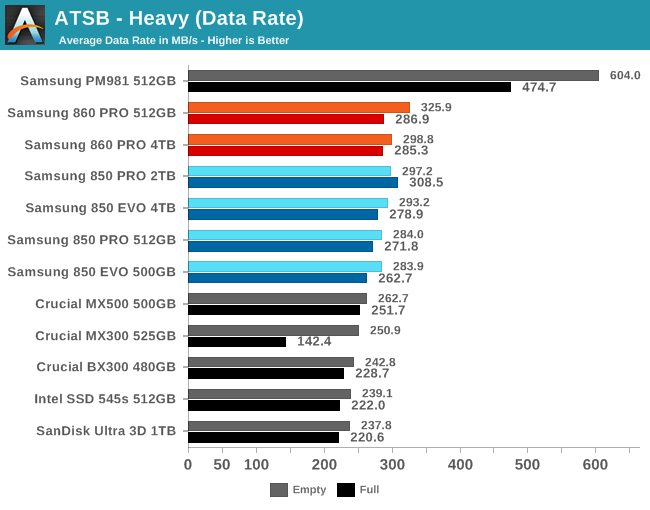
As with The Destroyer, Samsung's SATA SSDs were still on top before the Samsung 860 PRO arrived. The 860 PRO brings only modest improvements to the average data rates on the Heavy test, and the 512GB models is slightly faster than the 4TB model. The only real outlier here is the Crucial MX300, for its poor performance when the drive is full.
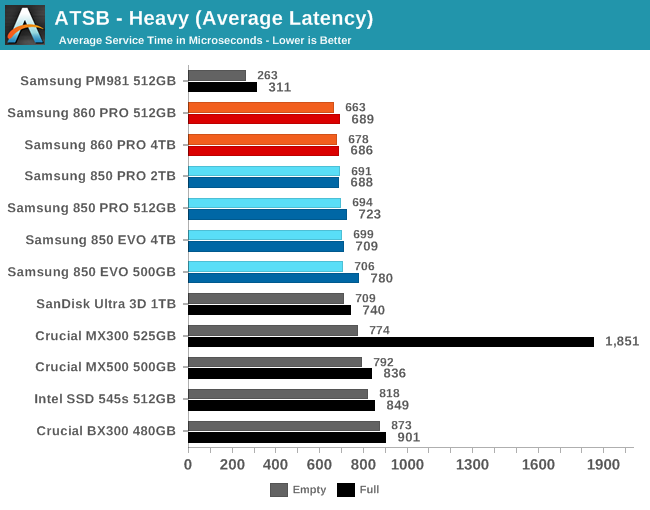
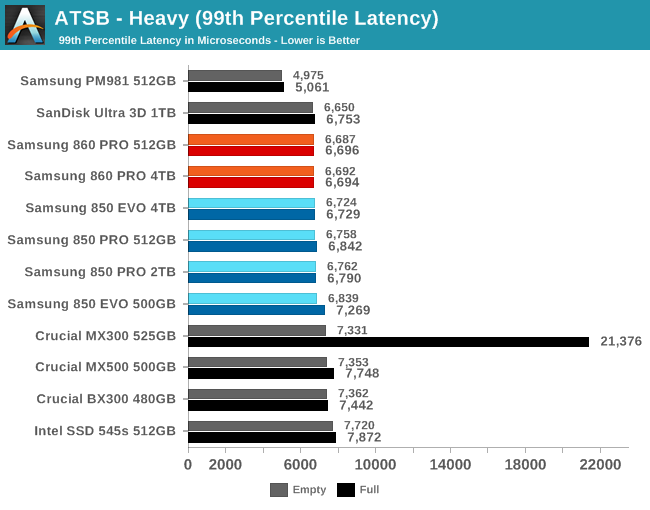
The Samsung MLC SSDs and the SanDisk Ultra 3D offer the best average and 99th percentile scores among the SATA drives, but even the current models from Intel and Crucial are close enough to be indistinguishable without benchmarking tools.
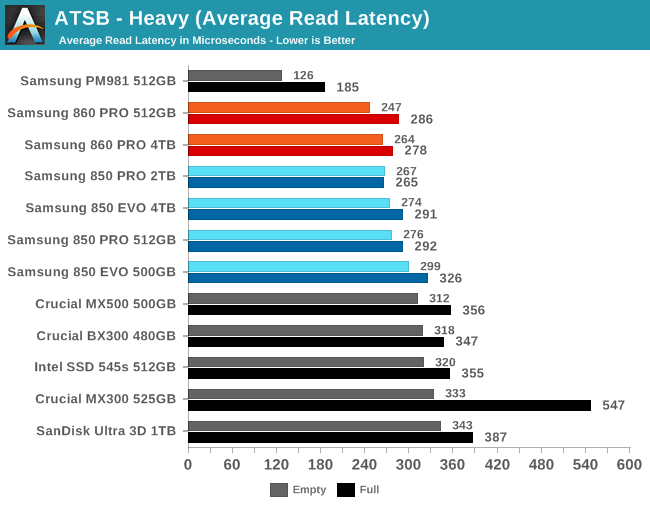
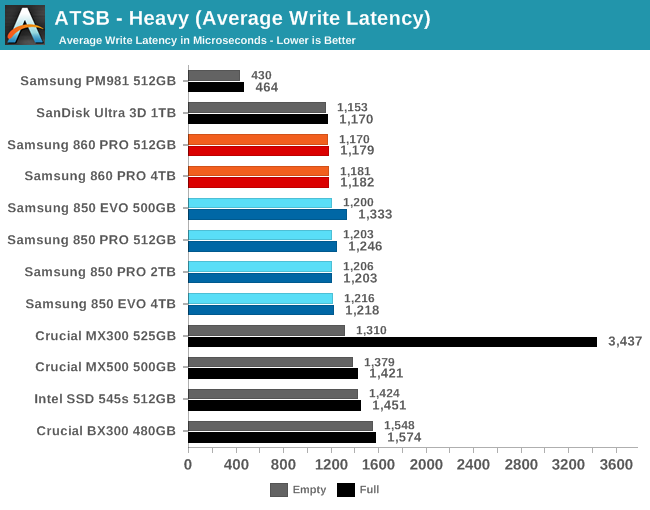
Most of the drives show small differences in average read latency between the full and empty drive test runs, but it's the write latencies that account for the bulk of the delays experienced during this test. The Samsung 860 PROs are among the several drives that show virtually no difference in average write latency when the drive is full.
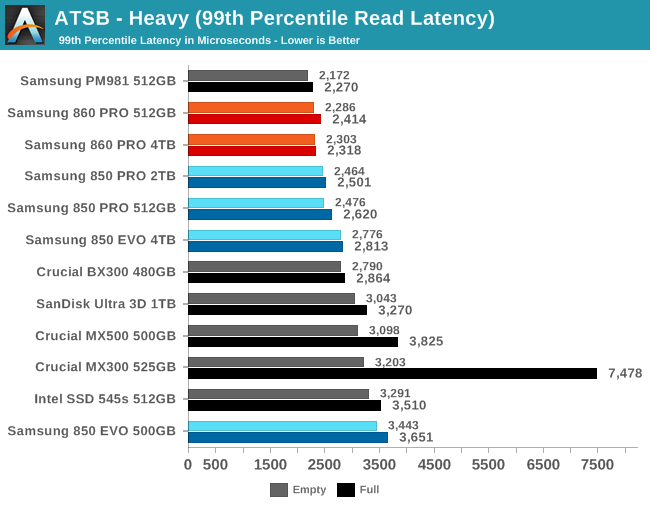
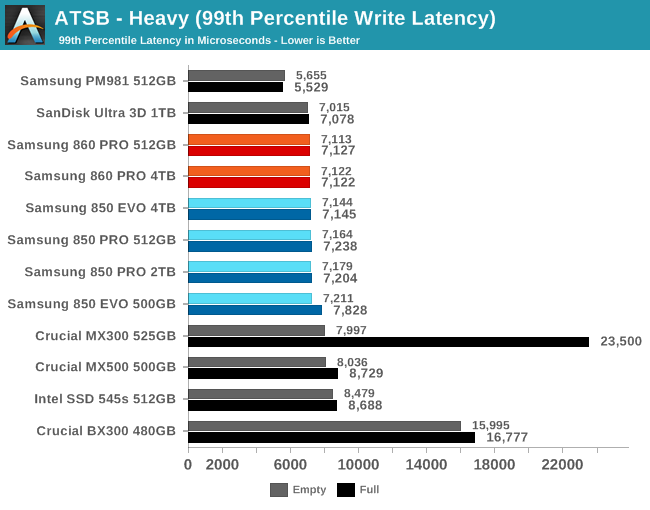
The 99th percentile read and write latency scores show that most of these SATA SSDs are equally competent at keeping latency under control. As usual, the Crucial MX300's full drive results stand out as particularly bad, and the BX300 is revealed to have a problem with high latency writes whether or not it is full.
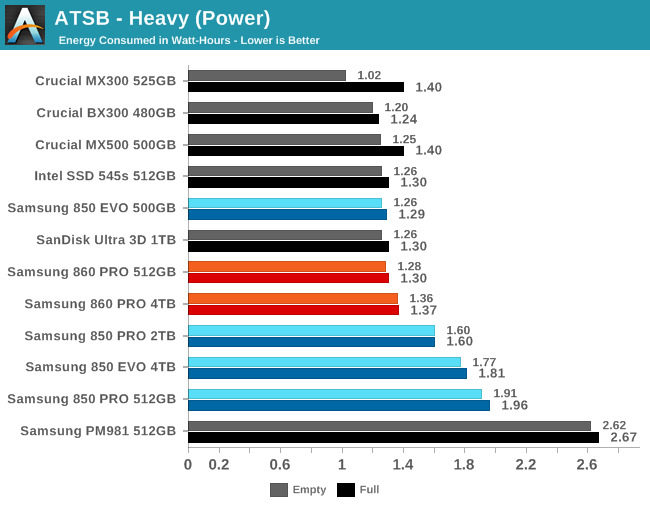
The 860 PRO mostly eliminates the gap in power efficiency relative to the modern competitors. The 4TB model requires slightly more power than the 512GB, but is still a substantial improvement over the multi-TB 850s.










64 Comments
View All Comments
WithoutWeakness - Tuesday, January 23, 2018 - link
Impressive drive. We've definitely hit the point where the SATA bottleneck prevents any serious performance improvements. Looks like the 860 EVO nearly matches the PRO's speeds (at least on paper) and costs 33% less at all capacities. It seems like the trend will continue of recommending the latest Samsung EVO drive to anyone who needs a SATA SSD and people with extra money to spend can upgrade to the PRO. Almost no reason to buy any other drives unless you can find them at ridiculous sale prices.generaldwarf - Tuesday, January 23, 2018 - link
the 860 evo is 33% cheaper and 50% less endurant = 860 pro is cheaper on the long runDanNeely - Tuesday, January 23, 2018 - link
Unless you're doing insanely high write levels (for anything in the consumer/prosumer space) both drives will probably fail in 5-10 years of old age without coming anywhere near their endurance limits. The pro just has extra overkill on that number.Flunk - Tuesday, January 23, 2018 - link
Definitely, for client loads you're not going to hit that write endurance before the drive dies from something else.But if the Samsung 860 PRO dies within 10 years it's still under warranty. I recently had a 4.5 year old Samsung 840 PRO die on me and Samsung shipped me an essentially brand new 850 PRO as a replacement. The EVO comes with a 5 year warranty, which while good, is not as good.
DanNeely - Tuesday, January 23, 2018 - link
The 860pro is down to the same 5 years as the 860 EVO.chrcoluk - Friday, September 6, 2019 - link
My 850 pro almost died at 4 years and 10 months (mirroring your view that a 5 year warranty is pushing it close).Sent to samsung RMA, they ran what was clearly a very basic test only (they completed RMA testing in just 40 mins according to status page) and returned as non faulty.
They returned a drive that was randomly not appearing at post and had corrupted boot files as non faulty. I didnt trust it so put it in a spare rig, installed windows on it, and ran some i/o tests, on the first test it locked up during heavy i/o load. After giving it a while to recover I rebooted and the drive was gone in bios, but this time it hasnt recovered at all now seemingly completely dead.
For the curious the erase cycles are extremely low only 40 or so erase cycles, data written was at over 20TB, nowhere near the 150TB warranty.
Given these figures I would say a higher amount of years on the warranty is far more valuable than a higher TBW limit, so the 860 pro's are a nerf. The fact samsung are no longer willing to offer 10 years on their pro units is quite telling. If the 10 year policy wasnt costing them money then they wouldnt mind doing it, which must mean the failure rate at 4+ years is high enough to warrant the change.
Alistair - Tuesday, January 23, 2018 - link
MX500 is cheaper, performs almost the same. And they actually provide warranty service in Canada properly, unlike Samsung.Check this forum:
https://forums.redflagdeals.com/has-anyone-dealt-s...
Samus - Wednesday, January 24, 2018 - link
Yeah, hard to ignore the MX500 and BX300 (if looking for a smaller capacity drive) because they are so easy to find, inexpensive, and the support is solid. I’ve had great luck with crucial/Micron drives, especially models with Marvell controllers, for nearly a decade. I’ll never forget when I installed the C300 in my laptop in 2010, my first experience with 500MB/sec data transfers and 5 second windows startups.Samus - Wednesday, January 24, 2018 - link
The long run of what? By the time the drive warranty is up SATA will go the way of PATA/IDE. Does anybody seriously think SATA will be around in 5 years? We already have consumer hard drives bottlenecked by SATA2!smilingcrow - Wednesday, January 24, 2018 - link
I fully expect SATA3 to be still around in 5 years. Hard Drives and even DVDs aren't going away and it would seem pointless to replace SATA for those types of devices as it offers sufficient bandwidth for years to come.